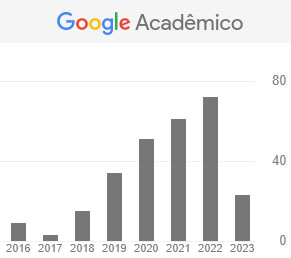Content knowledge gathered by undergraduate students in Mathematics on Probability and Statistics based on data from Covid-19
DOI:
https://doi.org/10.5965/2357724X12232024e0204Keywords:
content knowledge, statistical thinking, probability and statistics, elementary schoolAbstract
In this article, we present the results of a study that aims to analyze the Content Knowledge mobilized by students on the topic of Probability and Statistics based on COVID-19 data. The study was developed with 16 students from a Mathematics undergraduate course at a federal educational institution in the state of Rio Grande do Sul, enrolled in the second semester of 2020 in a discipline that contemplates the discussion of different ways of organizing and presenting the Mathematics content in the final years of Elementary School. The data were collected through activities sent via Moodle and presentations in a virtual classroom, via Google Meet, containing three problems developed by the students on the Probability and Statistics content covered in Elementary School. Through a qualitative, interpretative analysis, we demonstrate how statistical thinking manifests itself in the face of the questions elaborated by the students. We also highlight the importance of using the question elaborating strategy, since this is one of the skills that Mathematics teachers must develop with their students throughout Elementary School and, therefore, we believe that activities that involve the discussion of themes and questions from the Mathematics curriculum and the practice of the future teacher are fundamental for the initial teacher education.
Downloads
References
BRASIL. Parecer CNE/CES nº 1.302, de 06 de novembro de 2001. Define as Diretrizes Curriculares para os Cursos de Matemática, Bacharelado e Licenciatura. Brasília, DF: MEC, 2001. Disponível em: http://portal.mec.gov.br/cne/arquivos/pdf/CES13022.pdf. Acesso em: 17 mar. 2021.
BRASIL. Ministério da Educação. Base Nacional Comum Curricular – BNCC. Brasília, DF: MEC, 2017.
BURGESS, T. Teacher knowledge and statistics: what types of knowledge are used in the primary classroom? The Mathematics Enthusiast, Missoul (MT), v. 6, n. 1, p. 3-24, 2009.
BURGESS, T. Using classroom video to identify development of teacher knowledge. In: READING, C. (org.) Data and context in statistcs education: towards na evidence-based-society. Proccedings of 8th International Conference on Teaching Statistics (ICOTS8). Voorburg. The Netherlands: International Statistical Institute, 2010. p. 1-6.
HENRIQUES, A.; OLIVEIRA, H. M. O conhecimento de futuros professores sobre as investigações estatísticas a partir da análise de episódios de sala de aula. In: FERNANDES, J. A.; VISEU, F.; MARTINHO, M. H.; CORREIA, P. F. (orgs) Atas do III Encontro de Probabilidade e Estatística na Escola. Braga: Centro de Investigação em Educação da Escola de Minho, 2013. p. 1-14.
LIMA, R. F. Estado do conhecimento da produção acadêmica sobre o ensino e a aprendizagem de Educação Estatística no Ensino Superior. Boletim online de Educação Matemática, Florianópolis, v. 8, n. 16, p. 72-90, 2020.
SCHREIBER, K. P.; PROCIÚNCULA, M. Estado do conhecimento da produção científica sobre formação de professores para o ensino de Estatística. Educação Matemática Pesquisa, São Paulo, v. 22, n. 1, p. 1-21, 2020.
WALICHINSKI, D.; SANTOS JUNIOR, G. Educação estatística: objetivos, perspectivas e dificuldades. Imagens da Educação, Maringá, v. 3, n. 3, p. 31-37, 2013.
WILD, C. J.; PFANNKUCH, M. Statistical thinking in empirical enquiry. International Statistical Rewiew, The Hague (The Netherlands), v. 67, n. 3, p. 223-265, 1999.
Downloads
Published
How to Cite
Issue
Section
License
Copyright (c) 2025 Revista BOEM

This work is licensed under a Creative Commons Attribution-NonCommercial-NoDerivatives 4.0 International License.
Declaração de Direito Autoral
Os artigos publicados pela Revista BOEM são de uso gratuito, destinados a aplicações acadêmicas e não comerciais. As/os leitoras/es são livres para transferir, imprimir e utilizar os artigos publicados na Revista BOEM, desde que sempre haja menção explícita ao/s autor/es e à BOEM e que não haja qualquer alteração no trabalho original.
Todos os direitos autorais são atribuídos à revista BOEM. Ao submeter um artigo à Revista BOEM e tê-lo aprovado, as/os autoras/es concordam em ceder, sem remuneração, os direitos autorais à revista BOEM e a permissão para que a revista BOEM redistribua esse artigo e seus metadados aos serviços de indexação e referência que seus editores julguem apropriados.
Os artigos cujos autores são identificados representam a expressão do ponto de vista de seus autores e não a posição oficial da Revista BOEM.
O BOEM adota a licença Creative Commons - Atribuição-Não Comercial-Sem Derivações 4.0 Internacional.



